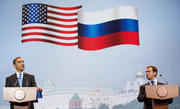 The well-connected Jim Hoagland has a preview of how the Obama administration hopes the next year or so of its foreign policy will pan out. On Iran, still the biggest foreign policy challenge facing this administration, Hogland writes:
The well-connected Jim Hoagland has a preview of how the Obama administration hopes the next year or so of its foreign policy will pan out. On Iran, still the biggest foreign policy challenge facing this administration, Hogland writes:
‘The next diplomatic trampoline for Obama is the G-20 summit [on September 24th], which he will host and hope to use to forge new multilateral approaches on Iran and Middle East peace, as well as on global economic recovery. The president came back from Europe this month with what one senior U.S. official described to me as “Russian and G-8 buy-in” to that concept.
“If the Iranians have not responded by then, the world should make clear to them they cannot stall indefinitely,” says an official who knows Obama’s thinking. “The summit is also the right moment for a global assessment of how much progress has been and can be made between Israel and the Palestinians.”
Pittsburgh will be a moment of truth particularly for Russian President Dmitry Medvedev, whom Obama has wooed in hope of getting Moscow’s support for imposing new U.N. sanctions on Iran. If it is not forthcoming, Obama’s credibility will suffer.’
It strikes me that this approach is far more likely to fail than to succeed: Russia and the West’s interests are simply not aligned on Iran. Moscow might hint that it is willing to co-operate in order to secure other goals that are important to it. But it is hard to imagine Russia co-operating in the whole-hearted way that would be needed for diplomatic measures such as sanctions to make any difference to the Iranian leadership’s attitude to its nuclear programme.







Comments